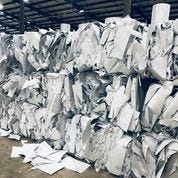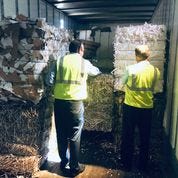4G Recycling Sheds Light on the Pandemic’s Long-Term Impact

Waste360 has been reporting for half a year on how the waste management industry has been faring through COVID-19.
Now, we bring a slightly varied twist in that we tell some of the stories through the lens of a company that buys and sells scraps.
4G Recycling, headquartered in Deerfield Beach, Fla, also supports large waste generators from a far-reaching expanse of niches in running efficient recycling programs.
Axel Iglesias, Recycling Commodity marketing director for 4G Recycling, shares insight on how COVID-19 has impacted operations for the fourth-generation, family-owned company with its diverse portfolio and how it’s adapted. He provides an inside view of shifts in business operations that are happening as he spoke to us. And he speaks about the pandemic’s potential long-term impact on the industry.
Waste360: How does COVID-19’s impact on the industry compare to anything you have seen the recycling industry go through?
Axel Iglesias: Honestly, there is nothing that our generation in recycling or even my father’s generation can compare to what the recycling industry is currently going through. The closest thing I would think would have to be the Great Depression, and during that time the recycling industry was in its very infant stages. In 2019 we experienced the worst markets the industry, and our company, had ever experienced with historic low pricing and movement for many key high grades. With regard to this new difficult event—COVID-19—it is too early to define what lasting or long-term effects there may be on the recycling industry. There are shifts happening today with consumers, retailers, manufacturers, small and large businesses that may have large fundamental impacts. For instance, if people continue working from home there will be the ongoing trend of less office waste.

Waste360: How is 4G, specifically, faring through COVID-19? And what have you done to keep going?
Axel Iglesias: While the industry overall has been hard hit, our business model is different than many waste companies’. First, we don’t have recycling plants; we buy and sell scrap.
In addition, we have a well-diversified portfolio across many different industries. This is a strategy we began executing in late 2018 to prevent large shifts in our revenue due to markets. And it has served us well during the pandemic because while some of our customers were shut down due to being non-essential businesses others like grocery and e-commerce retailers were up significantly, making up the gap and keeping us pretty much in line with 2019 year over year. Our revenue is only slightly down from last year.
However, we have had to work hard. The past year has illustrated the importance of keeping recyclables moving, even when markets may not exist. In 2019, the commodity value of recyclables hit an all-time low in almost every category, with reports that nearly one in five recyclers were on the verge of going out of business or just simply stopped taking material from many of their customers. But 4G acted quickly, leaning on our established strong partnerships and opening strategically located warehouses, enabling the company to continue moving materials despite much lower pricing, and despite limited orders from paper mills.
The COVID-19 pandemic has required us to be more nimble than ever before, as we adjust to the unprecedented changing market demands and related client needs. Fortunately, our responsiveness helped us access new contracts across the country and ensure that current clients could continue recycling with little interruption. One of the most important things we did was to move quickly to get certified in the states where we work as an essential business so that we could keep operating. And from very early on we ordered laptops, monitors, and other resources so our employees could work at home.
Waste360: Who are your customers and how has it affected them? And how has impact on them affected 4G?
Axel Iglesias: 4G Recycling services more than 400 locations in 48 states, and our customers expand across a variety of industries, including grocery and e-commerce retailers, manufacturers, printers, packaging companies, sports stadiums, and retail distribution centers to name a few.
While all industries have been impacted to some degree by the COVID-19 pandemic, it has affected each of our clients in different ways. For example, recyclables from sports stadiums slowed to a near halt, as the pandemic put an end to large-scale gatherings. However, demand for groceries has increased as people stay home, and grocery retailers have seen a 25 to 30 percent increase in their recyclable commodities such as OCC (old corrugated cardboard) and LDPE (low-density polyethylene). Here in Florida, we moved to phase 2 in mid September, which enabled restaurants to go from 25 percent to 50 percent capacity, but they are still obviously impacted ((since Waste360 talked to Iglesias, Florida Gov. Ron DeSantis announced the state was moving into phase 3). Meanwhile, the increase of online ordering for groceries and other products has resulted in about a tripling of e-commerce business, so we are seeing a lot more packaging and other materials generated by this business model.
 Waste360: Do you see any changes within recyclers’ operations that have been driven by COVID sticking over the long term?
Waste360: Do you see any changes within recyclers’ operations that have been driven by COVID sticking over the long term?
Axel Iglesias: It is too early to know if something will stick long-term, certainly if there are structural changes to how people go to work, schools, etc. And it is yet to be seen if the type of recyclables collected changes, but if there are changes there will have to be permanent adjustments made by recycling plants, paper mills and end users.
As one example: if people continue to work at home obviously that could mean an ongoing increase in residential waste and decrease in commercial waste.
Waste360: What are some specific adaptations you have made as a result of the pandemic?
Axel Iglesias: For us, thinking out of the box and being flexible in how we approach our customers, and new business development is key. We’ve adapted well to video calls; our sales reps are now driving to more clients verses flying in order to continue having face-to-face communications through COVID. When possible and appropriate we want to keep our personal approach to doing business: walking floors, doing waste audits, training our customers, implementing process improvements, etc.
We have actually seen a 10 percent increase in volumes of recycling materials. This dynamic is a testament to the value of our 4G program where we provide for clients, as we’re now selling much more on value-added services than on price.
Waste360: How has logistics been affected, and what are you doing to address this?
Axel Iglesias: Logistics has been considerably more challenging with the rise in COVID-19. Initially there were driver shortages in the industry related to volume spikes in certain sectors and uncertainty with regard to rest stops where drivers could sleep and eat.
On average 4G moves 200 trucks per day of recyclables around the country and 50 export containers per week around the world. We are seeing reduced availability of drivers and trucks. And freight prices have increased at a much faster pace than historically. These drastic logistics-related changes are impacting the overall domestic supply chain and profitability of many businesses.
Some recycling companies have implemented more efficient schedules for waste pickups whereby they will only collect on a certain day, which is a concern for companies that do not want production impacted by waste backing up.
We are fortunate that despite the challenges from coronavirus, our partners are standing behind our business. And because we do not own trucks, we aren’t impacted by driver shortages as we have more flexibility to use whoever has the availability.
About the Author
You May Also Like




.png?width=300&auto=webp&quality=80&disable=upscale)